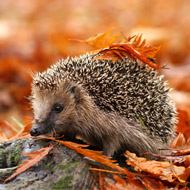RSPCA reports rise in hedgehog cases

The RSPCA is asking communities to keep a watchful eye out for potentially unwell hedgehogs, this winter.
The RSPCA is asking communities to keep a watchful eye out for potentially unwell hedgehogs, this winter. The charity has reported a significant increase in the number of the species admitted into its care, over the past year.
The winter months are always busy for the RSPCA wildlife centres but 2016 has seen more than 400 hedgehogs brought in for treatment.
Adam Grogan, Head of Wildlife at the RSPCA, said: “We are always busy with the number of hedgehogs being admitted to our centres at this time of year - but this year has been busier than usual. We’ve had a real seasonal surge.
“All of our four wildlife centres have been inundated with these prickly creatures and our staff are working hard to look after them.
“If a hedgehog is out in the daytime there is probably something wrong as they are usually nocturnal. The ones that would cause us most concern would be very young hedgehogs out on their own that are not big enough to survive hibernation.
“Hedgehogs need plenty of fat reserves to see them through the winter as they hibernate so any that are not up to a good size would be a concern.
“With the sudden cold snap we are unable to release the ones we have in our care back to the wild for the time being - but as soon as they are up to a good weight, the weather improves and we feel they will be able to fend for themselves we will be returning them to the wild, where they belong.”
For more information about hedgehogs, please visit the RSPCA website: www.rspca.org.uk/adviceandwelfare/wildlife/orphanedanimals/younghedgehogs.
To report a concern over the welfare of a wild animal, please contact the RSPCA advice line on 0300 123 4999.



 The Veterinary Medicines Directorate (VMD) is inviting applications from veterinary students to attend a one-week extramural studies (EMS) placement in July 2026.
The Veterinary Medicines Directorate (VMD) is inviting applications from veterinary students to attend a one-week extramural studies (EMS) placement in July 2026.